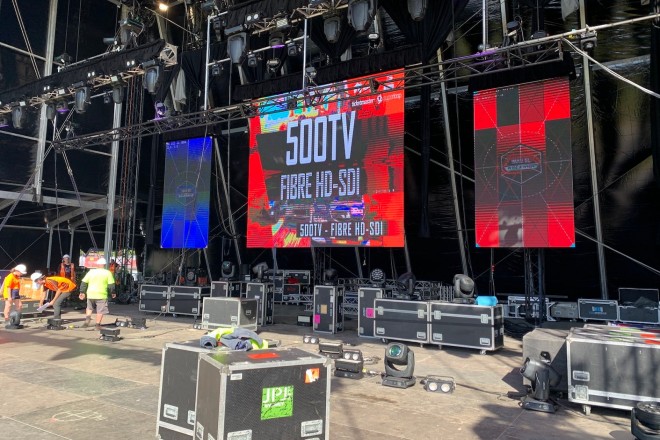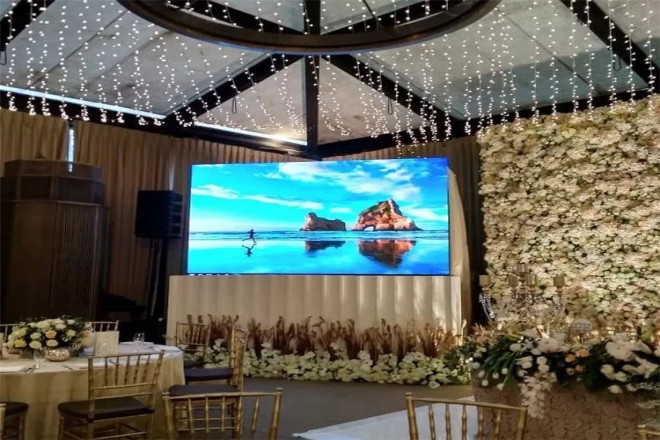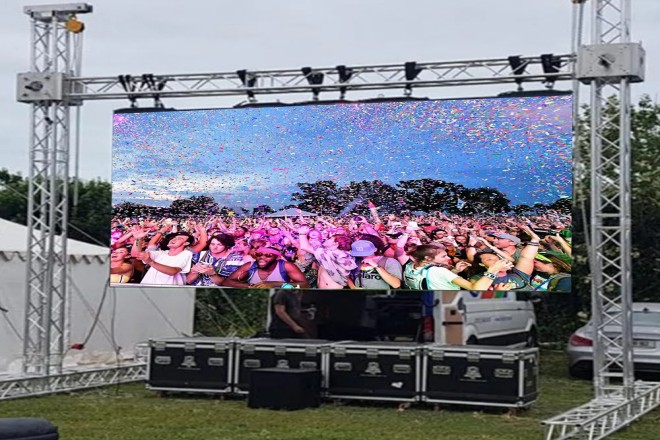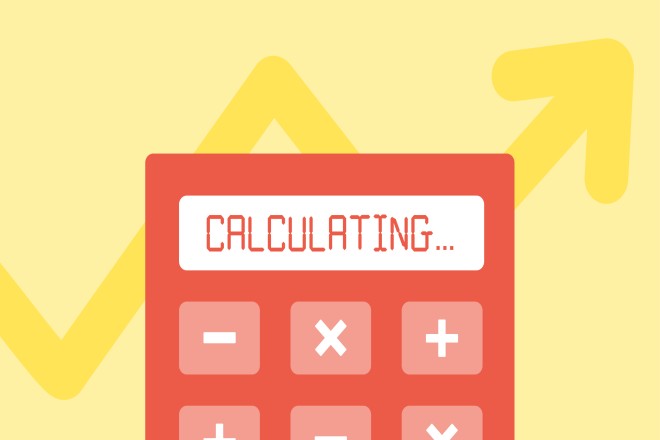Introduction

Whether it is a brand, shopping mall event, outdoor wedding, outdoor event, etc., a high-quality LED display can greatly enhance the visual effect and audience experience of the event.
However, for many organizers, the cost of purchasing an LED display is too high, so leasing becomes an affordable option. But how to estimate the price of leasing an LED display is a question that confuses many people.
This article will take you to an in-depth understanding of the multiple factors that affect the price of LED display rental, helping you make a more informed decision.
1. Basic parameters of LED display screens
As a widely used display device, LED display screens play an important role in many fields such as outdoor advertising, commercial displays, stage performances, and sports stadiums. The following is an introduction to the basic parameters of LED display screens:
1). Size and resolution
- Size:
The size of the LED display screen determines its display area, usually expressed in the form of length × width, such as 3 meters × 2 meters. The larger the size, the richer the display content, but the corresponding rental cost will also be higher.
Resolution refers to the number of pixels per unit area on the screen, usually expressed in horizontal pixels × vertical pixels, such as 1920 × 1080. The higher the resolution, the clearer the display effect.
For LED display screens, resolution is related to size and dot pitch. Under the same dot pitch, the larger the size, the higher the resolution.
Under the same size, the smaller the dot pitch, the higher the resolution. Common resolution expressions include P2, P3, P4, etc. The smaller the number, the higher the pixel density.
2). Types of rental LED display screens
Mostly used in indoor occasions, such as commercial displays, conference rooms, etc. It is characterized by moderate brightness, bright colors, high resolution, and is suitable for close viewing.
Mostly used in outdoor advertising, stage performances and other occasions. It has a high brightness and can maintain a clear display effect under strong light, but the resolution may be slightly lower than that of indoor screens.
- Curved rental LED display:
Such as curved LED display, usually composed of flexible soft modules, can be made into various arc effects such as inner arc, outer arc, circle, etc., and is mostly used in advertising occasions.
In addition, there are also monochrome rental LED display (mostly single red, used to display text and other slogans), two-color rental LED screen (red and green, mostly used for strip screen display) and full-color rental LED display (can display various colors, mostly used for indoor and outdoor advertising occasions) and other types.
Different types of LED display screens will also vary in manufacturing costs and rental prices.
2. Selection of rental schemes for LED display screens

When choosing a rental scheme for LED display screens, it is indeed necessary to consider the rental period and whether there are special needs. The following is a detailed analysis of short-term rental, long-term rental, and special rental schemes:
1). Short-term rental and long-term rental
1.1). Short-term rental
- Applicable scenarios:
Short-term rental is mainly suitable for temporary activities, such as exhibitions, press conferences, commercial performances, celebrations, etc.
These activities are usually time-sensitive and need to attract a large number of audiences or participants in a short period of time, so the rental period of LED display screens is relatively short.
- Advantages:
Short-term rental can flexibly respond to temporary needs and reduce the operating costs of enterprises. At the same time, rental companies usually provide one-stop services, including equipment installation, commissioning and maintenance, to ensure the smooth progress of activities.
1.2). Long-term lease
- Applicable scenarios:
Long-term lease is suitable for occasions that require long-term display, such as commercial places such as shopping malls, supermarkets, hotels, restaurants, and cultural places such as museums and exhibition halls.
These places usually require LED screens to display advertisements, promotional information or works of art, and the display period is relatively long.
- Advantages:
Long-term leases can provide enterprises with more stable and lasting display effects while reducing the purchase cost and maintenance costs of equipment.
Leasing companies usually provide customized leasing plans based on the specific needs of enterprises to ensure that the performance and quality of the equipment meet the requirements of the enterprise.
2). Special leasing plans
In addition to the common short-term lease and long-term lease, there are some special leasing plans to meet the different needs of enterprises:
2.1). Daily lease
- Applicable scenarios:
Applicable to occasions that require short-term and flexible adjustment of display time, such as temporary exhibitions, promotional activities, outdoor advertising, etc.
- Advantages:
Daily lease can provide enterprises with higher flexibility and adjust the lease period and fees at any time according to actual needs.
2.2). Hourly lease
- Applicable scenarios:
Applicable to occasions that require precise control of display time, such as press conferences, product demonstrations, conference speeches, etc.
- Advantages:
Hourly leasing can provide enterprises with a more accurate billing method and reduce unnecessary expenses. At the same time, leasing companies usually provide professional technical support and on-site services to ensure the smooth progress of activities.
2.3). Customized leasing plan
- Applicable scenarios:
Applicable to occasions with special needs, such as specific size, specific resolution, specific installation method, etc.
- Advantages:
Customized leasing plans can provide enterprises with customized LED display leasing services to ensure that the performance and quality of the equipment meet the special requirements of the enterprise.
At the same time, leasing companies usually provide professional consulting and design solutions to help enterprises better achieve display effects.
3. Installation and service costs

When we talk about the installation and service costs of LED display screen rental, it actually involves three main costs: installation and disassembly costs, transportation and logistics costs, and technical support and maintenance costs. Below, I will explain these costs in simpler terms.
1). Installation and disassembly costs
This cost mainly depends on whether the installation location is difficult to handle and how many people are needed to help. For example, if you want to install a display screen in a very high place or a place that is difficult to enter, you have to hire more people and use more tools, and the cost will naturally be high.
Similarly, when disassembling, the same is true. If it is difficult to disassemble, the cost will also go up.
2). Transportation and logistics costs
This cost mainly depends on where the display screen is shipped from and how far it is from the rental location.
Just like when we send express delivery, the farther the distance, the higher the cost. Therefore, if the rental location is far from the supplier, the transportation cost will be relatively high.
3). Technical support and maintenance costs
This cost mainly depends on whether the rental company will provide additional services, such as someone to help adjust the display screen or someone to repair the display screen if it is broken.
These services are usually charged extra. Just like when we buy a mobile phone, some brands will provide free warranty services, but some require us to pay for the repair ourselves.
4). What can we do to save money?
When choosing a rental company, ask more about their service content and prices to see which one is the most cost-effective.
If possible, try to choose a place that is easy to install and disassemble so that the installation and disassembly costs can be saved.
Check in advance how far the rental location is from the supplier and choose a plan with lower logistics costs.
When renting, protect the display screen well and don’t let it break so that the maintenance cost can be reduced.
4. Market supply and demand and seasonal factors
When we delve into the LED display rental market, we will find that market supply and demand and seasonal factors are two extremely critical price-influencing factors. Next, I will explain these two factors to you in a more detailed and easy-to-understand way.
1). The impact of market supply and demand on the rental price of LED display screens
- The peak season of demand leads to price increases.
During certain specific time periods, large events, festivals, and sports events, such as annual graduation ceremonies, Christmas, and the European Cup; the demand for LED displays will increase significantly.
Imagine that when every corner of the city is full of festive atmosphere and various celebrations are held one after another, LED displays become an important tool for displaying the highlights of the event and attracting the audience’s attention.
However, the limited number of display screens and the overwhelming demand have created a situation where supply exceeds demand. In order to balance the market, rental companies often increase prices to meet more customer needs and ensure their own profits.
- Prices are higher in popular areas.
In addition to time factors, geographical location will also affect the rental price of LED displays. In some economically developed areas with frequent cultural activities, the demand for LED displays will naturally be higher due to people’s pursuit of high-quality life and love of cultural activities.
The market competition in these areas is more intense. In order to seize market share, rental companies may invest more resources and funds to improve service quality. However, these additional investments will eventually be reflected in the rental price, so the rental price of LED screens in popular areas is often higher.
2). The impact of seasonal factors on the rental price of LED screens
- Price changes in specific seasons or festivals
In certain specific seasons or festivals, such as the Spring Festival, National Day, Mid-Autumn Festival, etc., people are enthusiastic about celebrating activities, and the demand for LED screens will increase accordingly.
At this time, rental companies often adjust prices according to market demand. Generally speaking, prices during holidays are slightly higher than usual because customers during this period pay more attention to the atmosphere and effect of the event and are willing to pay a higher price for high-quality LED screens.
- Price fluctuations in the season of large-scale events
In addition to holidays, the seasons of some large-scale events will also affect the rental price of LED screens. For example, sports events are usually held in specific seasons, such as the World Cup in summer and the Olympic Games in winter.
These events not only attract audiences and media attention around the world but also bring huge business opportunities to the LED screen rental market. However, since these events are usually highly time-sensitive and professional, rental companies need to invest more resources and energy to ensure the quality and effect of the display.
Therefore, during these events, the rental price of LED display screens may also increase accordingly.
3). Coping strategies
In order to cope with price fluctuations caused by market supply and demand and seasonal factors, customers can adopt the following strategies:
Plan ahead: Communicate with the rental company in advance and book the display screen before the peak season or specific festivals. This ensures that the display screen can be rented smoothly when needed and may get a more favorable price.
Flexible choice of rental time: If possible, try to avoid renting the display screen during peak demand periods. For example, you can choose to rent in the off-season after a large event so that the price may be more reasonable.
Compare multiple companies: When choosing a rental company, you can compare the prices and service quality of several companies. By comparing the quotations and service content of different companies, you can choose a more cost-effective rental plan.
Consider long-term cooperation: Establishing a long-term cooperative relationship with a rental company can obtain more stable prices and better services. This not only reduces rental costs but also ensures that you can get timely support for the display screen when needed.
5. Price calculation method

Let’s explain the price calculation method of LED display screen rental in a simpler way and show it through an example.
Of course, the specific amount and billing method may be different for each LED display screen rental merchant. What we show is the most common calculation method, which you can use as a reference.
1). Price calculation method
When you want to rent an LED display screen, the fees you need to pay mainly include several parts:
The cost of the display screen: This is determined by factors such as the size, quality, and brand of the display screen. For example, large screens, high resolutions, and well-known brands may be more expensive.
Installation cost: This is the cost of installing the display screen at the specified location. If the location is difficult to install, or if additional equipment or manpower is required, the cost may be higher.
Transportation cost: This is the cost of transporting the display screen from the rental company to the place you specify. The farther the distance, the higher the cost may be.
Lease Duration: The longer you rent, the higher the total cost will usually be.
Technical support and maintenance costs: During the rental period, if there is a problem with the display screen, someone needs to solve it, which is the cost of technical support and maintenance.
Calculation method (formula)
Total cost = (display screen cost + installation cost + transportation cost) × rental duration + technical support and maintenance costs (may be charged per day or per time)
But please note that installation and transportation costs are usually one-time, that is, no matter how long the rental is, these two costs are only charged once.
2). Example
Suppose you want to rent a 10 square meter LED display for a two-day event.
Display screen cost: 100 yuan per square meter per day, so 10 square meters per day is 1,000 yuan.
Installation cost: 500 yuan in total (one-time).
Transportation cost: 800 yuan in total (one-time).
Rent duration: 2 days.
Technical support and maintenance costs: 200 yuan per day.
Then, the total cost is:
(1000 yuan/day × 2 days) + 500 yuan + 800 yuan + (200 yuan/day × 2 days)
= 2000 yuan + 500 yuan + 800 yuan + 400 yuan
= 3700 yuan
So, the total cost you need to pay is 3700 yuan.
Conclusion
Through the detailed analysis in this article, we can see that estimating the rental price of LED display screens is a complex process involving multiple variables. Understanding these factors can not only help you estimate the rental cost more accurately but also make you more confident when choosing a rental service.
Finally, if you want to know more about LED display screens, please get in touch with us.
